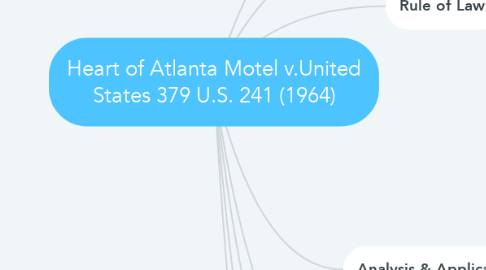
1. Facts:
1.1. Parties:
1.1.1. Heart of Atlanta Motel, Inc.
1.1.2. United States
1.2. What happened:
1.2.1. The foundation of the argument raised by Heart of Atlanta Motel, Inc. was whether or not congress exceeded their powers to regulate and monitor commerce. Specifically, the hotel intended to continue their practice of refusing business of African American’s. The 216-room hotel located in downtown Atlanta claimed The Bill of Rights Act (passed by Pres. Johnson on July 2, 1964) was (1) an overstatement of Congresses power to regulate commerce and (2) violates the Hotels rights, and requires it conduct involuntary servitude (protected by the Thirtieth Amendment) by forcing it to allow patronage from all races.
1.3. Procedural History:
1.3.1. US District Court for the Northern District of Georgia, Atlanta Division – 231 F. Supp. 393 (N.D. GA 1964) July 22, 1964. Heart of Atlanta Motel, Inc. (a Georgia Corp) v. United States of America and Robert F. Kennedy.
1.3.2. Heart of Atlanta Motel, Inc. (Appellant) V. United States. 379 U.S. 241. December 14, 1964.
2. Rule of Law:
2.1. The constitutionality of the Civil Rights Act of 1964 and it's application to the Heart of Atalanta Motel
2.1.1. Does the Motel qualify as a regulated establishment:
2.1.1.1. Public or Private
2.1.1.2. Number of Rooms for Rent
2.1.1.3. Local or Transient Patrons
2.1.2. Congress's Power to Regulate Commerce
2.1.2.1. The State Rule - Has Georgia Supported The Motel's Actions
2.1.2.2. Doe their Regulation Violate any of the Motel Operators Rights
2.1.2.2.1. Fifth Amendment
2.1.2.2.2. Thritheeth Amendment
2.1.2.2.3. Fourteenth Amendment
2.2. Necessary and Proper Clause
3. Issue:
3.1. “whether Congress exceeded its powers to regulate interstate commerce and pass all laws necessary and proper to such regulation in subjecting either this motel or this restaurant to Title II’s commands that applicants for food and lodging served without regard to their color. And if the regulation is otherwise within the congressional commerce power, the motel and the restaurant proprietors further contend that it would be a denial of due process under the Fifth Amendment to compel them to serve Negroes against their will.”
4. Analysis & Application:
4.1. Plaintiff/ Appellant: Heart of Atlanta Motel, Inc. Contends that Congress is exceeding their power by regulating commerce:
4.1.1. 1. The Civil Rights Act violates their Fifth Amendment by removing their right to select their customers and operate their business as it sees fit. As noted in the Syllabus, in limiting their actions the Civil Rights Act reduces their liberty without due process.
4.1.2. 2. Second, the motel operators suggest that forcing them to serve all subjects them to servitude and therefore violates their rights under the Thirteenth Amendment.
4.2. Defendant/ Appellee: United States Contends that Congress is within their power to regulate commerce, and that the lower courts ruling is valid.
4.2.1. 1. The Appellee argued that due to the Motels restriction of patrons that they are impacting commerce, and therefore, this case falls under the jurisdiction of Congress and their power to regulate interstate commerce. To evidence this it was established that the Motel is serving patrons beyond a local geography. As described in the background section, the Motel engages in national advertising campaigns, and serves primarily out of state patrons. As such, by limiting patronage the Motel will adversely impact interstate commerce by their actions.
4.2.2. 2. The Appellee countered the Appellant’s claim that the Act subjects them to servitude and limits their rights under the Thirteenth Amendment, by arguing that the Thirteenth Amendment is to address slavery, stripping or taking of rights, rather than discrimination in a public establishment.
4.2.3. 3. Lastly, as noted by the Civil Rights Act, the Appellee highlighted that the objective is to open equality to all with respect to goods, services for public accommodations. Specifically, they noted that the Heart of Atlanta Motel would be regulated by the act given that it is an establishment with five or more rooms available for rent and provides lodging for transient guests.
4.3. Court: Supreme Court of the United States
4.3.1. 1. How the court applied the rule- In a unanimous decision (9-0) the court affirmed the lower courts ruling. To arrive at this conclusion the court established:
4.3.1.1. a. that there is no establishment of state action- whereby the State of Georgia supported the Motel’s actions in discriminating certain patrons.
4.3.1.2. b. Gibbons vs. Ogden establishes Congress has the power to regulate commerce between states.
4.3.1.3. c. Necessary and Proper Clause allows Congress to take necessary actions to “foster and protect interstate commerce.”
4.3.1.4. d. It is not logical to argue that due process has been taken away from the Motel in the context of Congress regulating commerce, since Congress is the law of the land and have been granted power to do act.
4.3.1.5. e. The Fourteenth Amendment was designed to protect from unequal protection and liberties, therefore denying African Americans access to public accommodations would also be in violation of the Fourteenth Amendment.
4.3.2. 2. Expand/Reinterpret/Narrow:
4.3.2.1. a. Necessary and proper Clause: Based on my understanding of the Justices opinions that the view of Congress’s actions is expanded under the Necessary and Proper Clause to include any actions that could impact commerce, including purely local.
4.3.3. 3. Facts:
4.3.3.1. a. Given the Motels’ characteristics it meets the criteria of more than 5 rooms for rent, and that it serves the majority of out of state patrons, disproving the argument that they are purely a local operation and therefore exempt from Congress’s regulation.
4.3.3.2. b. Anti-Discrimination under the Civil Rights Act were accurately applied to the actions of the Motel.
4.3.4. 4. Analogy:
4.3.4.1. a. Justice Black noted that there are local lunchrooms which may operate entirely in a local setting, sourcing all of its materials and clientele from a local region, may be exempt from Congress’s reach, however, with nearly 20 million African Americans in the U.S. discriminating against such a large pool of people will disrupt commerce.
